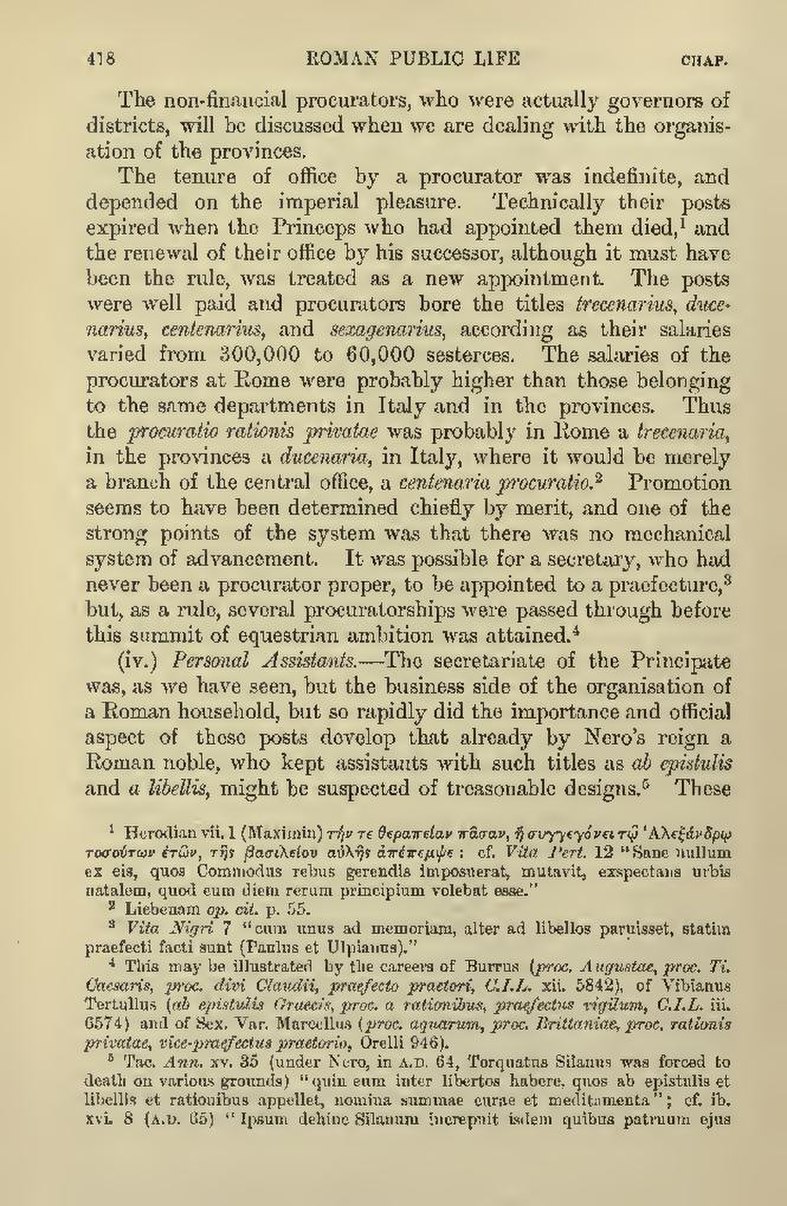The non-financial procurators, who were actually governors of districts, will be discussed when we are dealing with the organisation of the provinces.
The tenure of office by a procurator was indefinite, and depended on the imperial pleasure. Technically their posts expired when the Princeps who had appointed them died,[1] and the renewal of their office by his successor, although it must have been the rule, was treated as a new appointment. The posts were well paid and procurators bore the titles trecenarius, ducenarius, centenarius, and sexagenarius, according as their salaries varied from 300,000 to 60,000 sesterces. The salaries of the procurators at Rome were probably higher than those belonging to the same departments in Italy and in the provinces. Thus the procuratio rationis privatae was probably in Rome a trecenaria, in the provinces a ducenaria, in Italy, where it would be merely a branch of the central office, a centenaria procuratio.[2] Promotion seems to have been determined chiefly by merit, and one of the strong points of the system was that there was no mechanical system of advancement. It was possible for a secretary, who had never been a procurator proper, to be appointed to a praefecture,[3] but, as a rule, several procuratorships were passed through before this summit of equestrian ambition was attained.[4]
(iv.) Personal Assistants.—The secretariate of the Principate was, as we have seen, but the business side of the organisation of a Roman household, but so rapidly did the importance and official aspect of these posts develop that already by Nero's reign a Roman noble, who kept assistants with such titles as ab epistulis and a libellis, might be suspected of treasonable designs.[5] These: cf. Vita Pert. 12 "Sane nullum ex eis, quos Commodus rebus gerendis imposuerat, mutavit, exspectans urbis natalem, quod eum diem rerum principium volebat esse."]*
- ↑ Herodian vii. 1 (Maximin) [Greek: tên te therapeian pasan, êsyngegonei tô Alexandrô tosoutôn etôn, tês basileiou aulês apepempse
- ↑ Liebenam op. cit. p. 55.
- ↑ Vita Nigri 7 "cum unus ad memoriam, alter ad libellos paruisset, statim praefecti facti sunt (Paulus et Ulpianus)."
- ↑ This may be illustrated by the careers of Burrus (proc. Augustae, proc. Ti. Caesaris, proc. divi Claudii, praefecto praetori, C.I.L. xii. 5842), of Vibianus Tertullus (ab epistulis Graecis, proc. a rationibus, praefectus vigilum>, C.I.L. iii. 6574) and of Sex. Var. Marcellus (proc. aquarum, proc. Brittaniae, proc. rationis privatae, vice-praefectus praetorio, Orelli 946).
- ↑ Tac. Ann. xv. 35 (under Nero, in A.D. 64, Torquatus Silanus was forced to death on various grounds) "quin eum inter libertos habere, quos ab epistulis et libellis et rationibus appellet, nomina summae curae et meditamenta"; cf. ib. xvi. 8 (A.D. 65) "Ipsum dehinc Silanum increpuit isdem quibus patruum ejus
